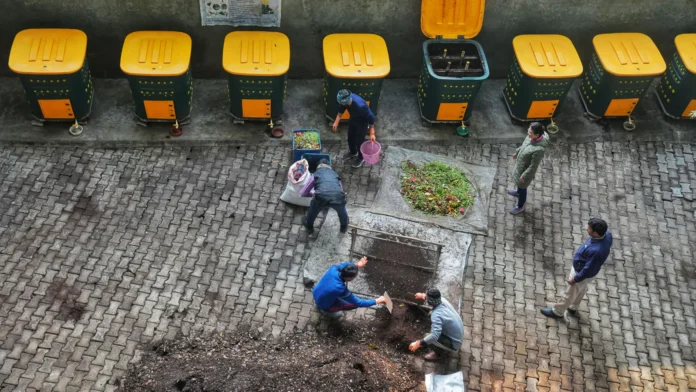Zero Waste has become a reality for the residents of Navjivan Vihar, a residential society in South Delhi’s Malviya Nagar. Over the last six years, this community of 280 families has ensured that none of the 225 kilograms of waste generated daily ends up in landfills. This remarkable achievement is the result of a meticulously organized circular waste economy spearheaded by the residents and their waste management hero, Mujahir Ali.
The Journey To Zero Waste
The residents of Navjivan Vihar start their day by separating dry waste from wet waste. This small but consistent effort forms the foundation of their sustainable waste management system. Every morning, Mujahir Ali, a dedicated waste worker, collects the waste using his cycle rickshaw equipped with four containers. These containers carry approximately 125 kilograms of wet waste and 100 kilograms of dry waste daily, initiating the process that keeps Navjivan Vihar’s waste away from landfills.
How The Circular Waste Economy Works?
Navjivan Vihar has implemented a system that converts waste into resources, embracing the principles of a circular economy.
- Wet Waste Processing: The 125 kilograms of wet waste collected daily is processed into compost. This nutrient-rich compost is used in the society’s gardens and sold to local farmers, creating a sustainable loop.
- Dry Waste Recycling: The dry waste, which includes paper, plastic, and metal, is segregated further and sent to recycling units. By ensuring proper recycling, the society reduces its environmental footprint.
- Minimal Residual Waste: Any residual waste is managed responsibly, ensuring that nothing ends up in landfills.
The Role Of Community Effort
The success of Navjivan Vihar’s zero waste initiative is rooted in the active participation of its residents.
- Segregation At Source: Every family in the society adheres to the practice of separating waste at home.
- Awareness Drives: Regular workshops and awareness campaigns are conducted to educate residents about the importance of waste management.
- Collaborative Approach: The society’s management committee works closely with waste workers like Mujahir Ali to ensure smooth operations.
Challenges Faced And Overcome
While the zero waste journey has been inspiring, it hasn’t been without challenges:
- Initial Resistance: Convincing all residents to adopt waste segregation practices required persistent efforts and community engagement.
- Infrastructure Setup: Establishing composting units and waste collection systems involved significant planning and investment.
- Sustained Commitment: Maintaining consistency in waste segregation and recycling required continuous motivation and education.

Impact On The Environment
The efforts of Navjivan Vihar have resulted in significant environmental benefits:
- Reduction In Landfill Contribution: By avoiding landfills, the society reduces greenhouse gas emissions and the burden on overflowing dumpsites in Delhi.
- Improved Soil Health: The compost produced from wet waste enriches the soil, promoting sustainable agriculture.
- Resource Conservation: Recycling dry waste conserves natural resources and reduces the need for virgin materials.
The Unsung Hero: Mujahir Ali
At the heart of Navjivan Vihar’s success story is Mujahir Ali, the waste worker who has been instrumental in implementing the zero waste system. His dedication and meticulous handling of waste collection and segregation have made him a local hero.
The Broader Implications Of Navjivan Vihar’s Success
Navjivan Vihar’s achievement serves as a model for other residential societies and urban communities:
- Scalable Solution: The principles of segregation, composting, and recycling can be replicated in other parts of the city and country.
- Policy Implications: Success stories like these can influence policymakers to promote zero waste practices and support community-led initiatives.
- Cultural Shift: By normalizing sustainable waste management, Navjivan Vihar is fostering a culture of environmental responsibility.
The Future Of Zero Waste In Urban India
As Indian cities grapple with the challenges of waste management, Navjivan Vihar’s zero waste model offers hope and inspiration. With the right combination of community effort, infrastructure, and awareness, urban areas can transition towards a more sustainable future.
The residents of Navjivan Vihar have shown that with determination and collaboration, it is possible to achieve zero waste and contribute to a cleaner, greener planet.

